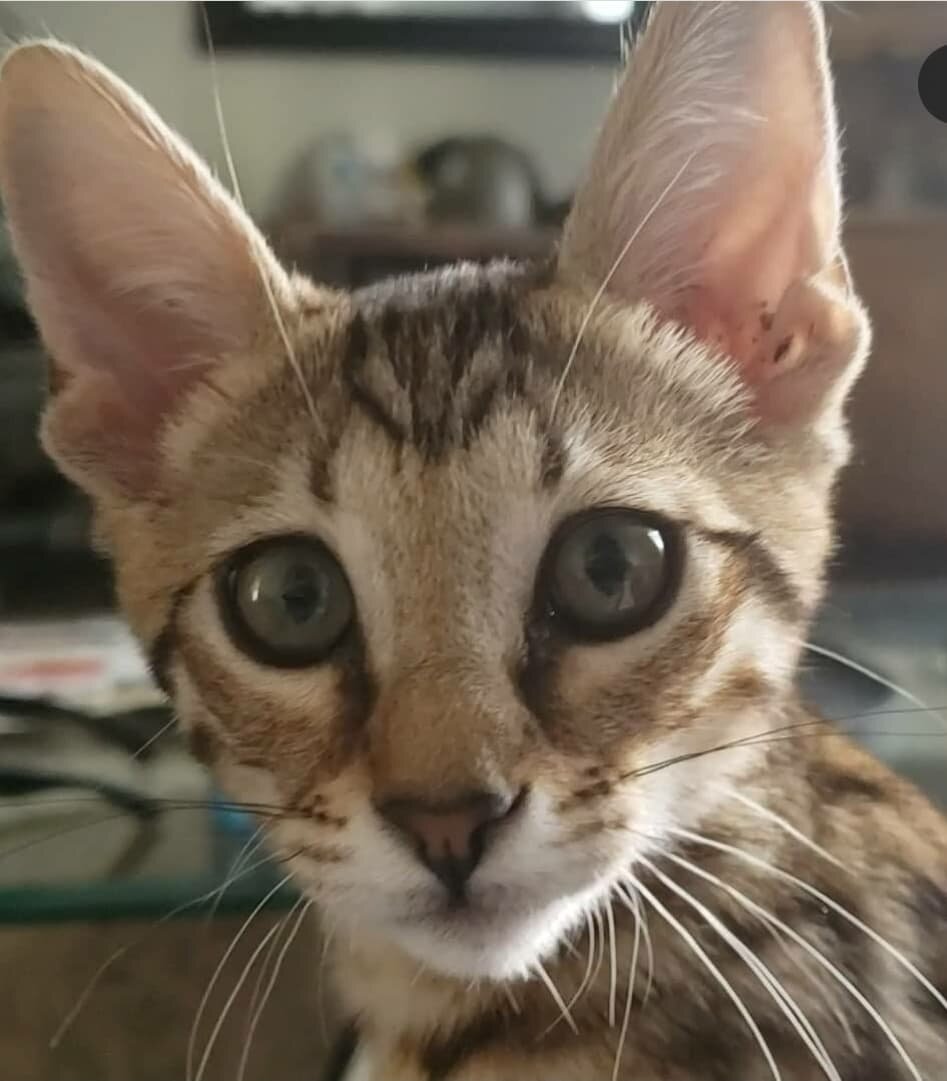F2 Savannah Cat Munchie’s Effusive FIP Journey to a Cure
On September 12, 2021, Munchie became lethargic and had lost two pounds since March. He had a fever, and there was fluid around his lungs. The vet suspected Feline Infectious Peritonitis (FIP) and collected the fluid sample. I searched the web to learn about FIP and found the FIP Warriors 5.0 Facebook page, which helped save Munchie’s life.
Luna the FIP-diagnosed Savannah Cat’s Final Photo Shoot…Or Was It?
Luna: My Dad took this photo with my mom the weekend the specialists at MedVet told them to take me home to die—that nothing could be done besides palliative care medications to ease my suffering. Dad set up the studio lights and took our final photos together--I’m only 14 weeks old. Look how sick and depressed I am. But my mom didn't give up on me. She worked around the clock contacting every veterinary college she could find. One of those colleges 3000 miles away responded. They told her to get me on a plan as soon as possible, and they would try to save me. They did. Today, I’m a thriving four-year-old who is free from the scourge called Feline Infectious Peritonitis (FIP).
If your cat is ever diagnosed with this horror, please contact my mom (savannahgans@gmail.com). She can tell your parents how to save you, just like I was saved!
Feline Pyometra: Symptoms, Causes, and Treatment
The word "Pyometra" derives from Latin "Pyo," meaning pus, and "metra," meaning uterus. Feline Pyometra is an abscessed, pus-filled, infected uterus. Toxins and bacteria leak across the uterine walls and into the bloodstream, causing life-threatening toxic effects. Without treatment, death's inevitable.
Luna: The First FIP-Surviving GS-441524 Clinical Trial Cat Turned Four Today - 1/9/2021!
Luna Was the First Privately Owned Cat to Survive Feline Infectious Peritonitis with the Drug GS-441524 (formerly EVO984) at UCDavis with Dr. Niels Pedersen in April 2017.
SAVANNAHGANS® Magazine Safety Brief: Common Household Items Toxic to Cats
A 2020 report by the Pet Poison Hotline indicated the most common toxin exposures in cats include: topical spot-on insecticides, household cleaners, human drugs such as NSAIDs (ibuprofen, naproxen), acetaminophen (Tylenol), and prescription medications, poisonous plants, human food items, and essential oils/potpourri.
Nile's Story: The Danger of Rodenticide Toxicity
I want to take this opportunity to share our 13-month-old F4 Savannah boy Nile and warn all cat owners about the dangers and warning signs of ingesting rodent poison.
Zuri's Story Part II: A New Diagnosis of Chronic Kidney Disease (CKD)
Just over six years ago, the Savannah Cat Rescue (SCR) chose me to be Zuri's new mom. Some of you know my girl, and some even donated to help her recover from a botched declaw. Deb Roberts wrote a fantastic article about Zuri in June 2020 about her journey in this magazine's inaugural issue "Savannahgans®." Zuri's story has since taken a new twist, and I'd like to share it here.
An Interview About Feline Hypertrophic Cardiomyopathy (HCM)
An interview with Dr. David Bostwick DVM, MS, DACVIM (SAIM) Veterinary Specialist Missoula Veterinary Specialty Clinic, Missoula Montana
The Story of Luna: A New Kitten, Fatal Disease Diagnosis, and a Miracle Cure with GS-441524
After careful research and education to learn about Savannah cats, and ultimately selecting a reputable breeder, Luna joined our family in March of 2017 at the age of 10 weeks. She was spunky, alert, playful, and in seemingly good health when I picked her up in Boston. Luna isn't your usual cat. She's exceedingly friendly, funny, quirky, overly loving, and loaded with personality. Luna exceeded all expectations of what we thought a Savannah cat would be. She quickly melded into our home and our hearts as our first pet.
Savannah Cat MYTH BUSTERS Featuring F1 Nimar: So You Think You Want A Great Big Cat?
One of the most common comments made by prospective Savannah owners is asking about the size of the Savannah cat. Everyone wants a large, beautiful, wild-looking cat. "The bigger, the better” is what they think.
The Ethics of Declaw: Why You Should Never Declaw Your Cat
Declawed cats will suffer medical effects; some may impact behavior such as urinating and/or defecating outside the litter box mostly because it hurts to get to the box and/or to use the box.













